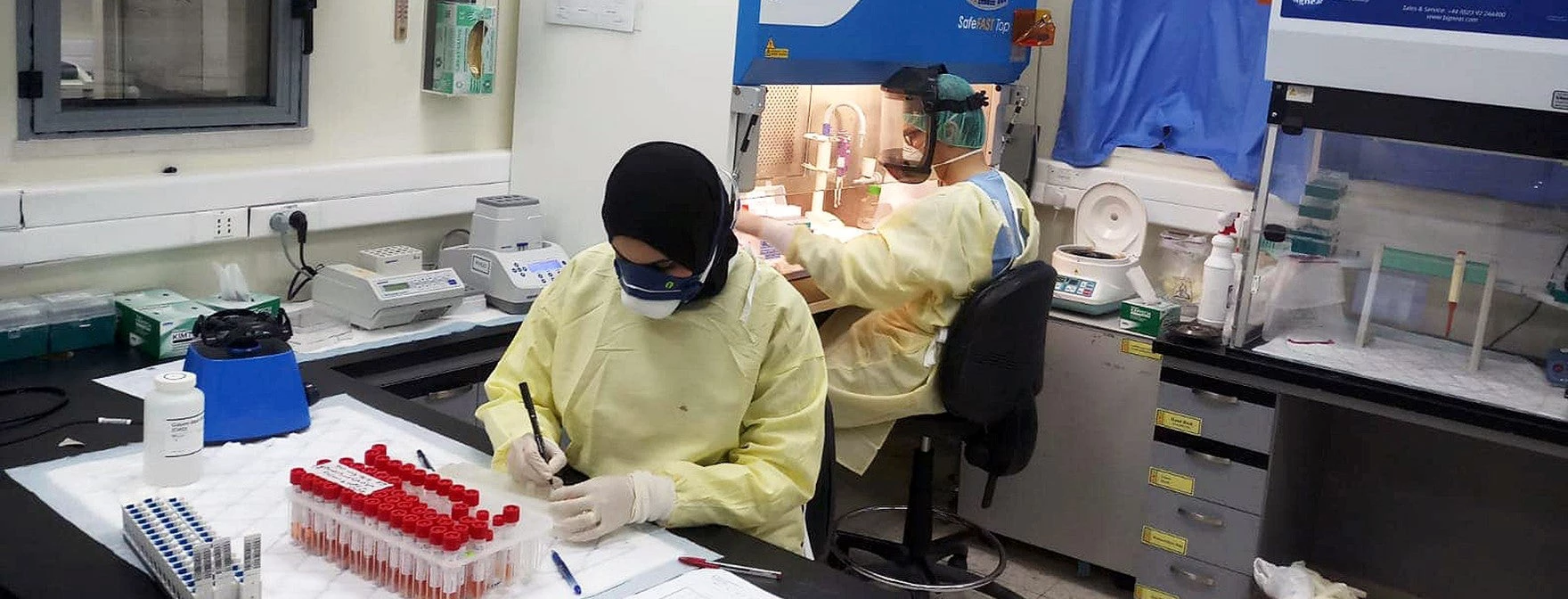 Ministry of Health, West Bank and Gaza. © World Bank
Ministry of Health, West Bank and Gaza. © World Bank
The Middle East and North Africa (MENA) region is facing an increasing burden on health systems from COVID-19 (coronavirus), with over 200,000 confirmed cases and almost 10,000 deaths reported. World Bank financing has already been mobilized throughout the region (including in Algeria, Djibouti, Egypt, Iraq, Jordan, Morocco, Tunisia, West Bank and Gaza, and Yemen), to help prevent, detect and respond to the direct impacts of COVID-19.
Beyond the direct effects of the virus, COVID-19 threatens the supply and demand for other essential health services. Models already point to a 15% potential decrease in use of maternal and child health services, threatening human capital accumulation in the region for years to come.
MENA countries already face a high and growing burden of non-communicable diseases; a diverse range of vulnerable and at-risk populations due to poverty, inequality, conflict and humanitarian crises; as well as weaknesses in their health systems. Hence MENA countries need to tackle a key question: how can they ensure the continuity of essential health services during COVID-19?
As policy makers strive to balance opening up the economy and containing the virus, strong health systems remain the bedrock of a robust response to the pandemic. By improving the equity and flexibility of its health systems, MENA can mitigate the impacts of COVID-19 in the short term and build back better in the longer term.
Improving health system equity
Improving the equity of health financing and service delivery in the MENA region is key to mitigating the direct and indirect impacts of COVID-19, particularly for the most vulnerable populations.
On average, countries here spend just 7% of their government budgets on health, with almost half of all health spending financed directly by households at the point of care. A typical MENA country also has 65% of its workforce in the informal sector, with little or no access to safety nets including health insurance.
Some countries, such as Egypt, have been reforming their financing and service delivery arrangements toward universal health care, also with the World Bank’s support. Notably, the Transforming Egypt's Healthcare System Project aims to screen 53 million Egyptians for non-communicable diseases and improve the quality of 600 primary health care facilities.
In the short run, user fees for all health services should be eliminated as an emergency measure to mitigate the reduction in demand during the pandemic. Currently, most providers are reimbursed on a case-by-case basis, leaving them vulnerable to reductions in the use of services. Reforming provider payment methods to introduce diagnosis-related groupings or scaling up direct budget transfers to frontline facilities would ensure the availability and quality of services.
At a national level, fiscal space for health should be rapidly increased. This would enable increased investment in medical and protective equipment to protect health workers in rural and hard-to-reach areas. Service delivery should prioritize displaced people and the elderly, who might have to live under targeted lockdowns for longer than others.
It is also crucial to increase the level of resources in health systems, as the region has some of the lowest levels of hospital capacity, medical doctors, nurses, and midwives per capita.
In many MENA countries, the private sector plays a significant role in delivering services, particularly primary care. However, these services are often inaccessible due to high cost and their concentration in urban areas. Governments should contract the private sector to provide both COVID-19 and other essential services, helping alleviate capacity constraints in the public sector.
Fostering flexibility
Countries need to adopt more flexible financing and redesign service delivery to triage infectious patients and stimulate demand for other essential services.
Strong health information systems enable flexibility, allowing countries to monitor utilization of health services in real time and to adapt the health system accordingly, both for COVID-19 and other essential health services. MENA countries can reduce the fragmentation of health information systems and integrate them with epidemiological surveillance systems to inform evidence-based decision making. This data could also be integrated with regional surveillance systems, such as the Africa CDC, and information-sharing between MENA countries would help contain future outbreaks.
COVID-19 underscores the need to move towards a patient-centered approach to service delivery, away from a facility-centered approach. With support from the World Bank, Morocco has rolled out mobile medical units to deliver care to rural communities, with almost 500,000 outpatient visits in 2018. These units could be rolled out in other countries and combined with home-based care.
Additional recommendations to foster flexibility include:
- Launching telemedicine. Informal telemedicine networks have already emerged across the region given high levels of internet connectivity. Telemedicine can play a role in ensuring that patients continue to receive non-urgent care, particularly those with chronic conditions.
- Introducing community health workers who can mobilize communities and deliver preventive services, thus minimizing service interruptions and ensuring equity.
- Integration of family medicine and care networks to strengthen primary health systems, which would ensure access to essential maternal, newborn and child health services, and enable delivery of preventive interventions for non-communicable diseases.
- Expanding hospital infrastructure, including triaging to accommodate COVID-19 cases and other patients at the same time.
- Reforming financing mechanisms to improve flexibility, through measures such as program-based budgeting. Modified regulations could ensure that providers are reimbursed for telemedicine and home-based care.
Over the past decade, MENA countries have made significant progress in improving health outcomes and launching ambitious reforms in the sector. With a focus on equity and flexibility, MENA countries can improve the resilience of their health systems and build back better, strengthening their ability to manage COVID-19 and improve the health of their people.



Join the Conversation